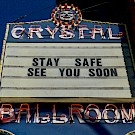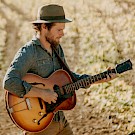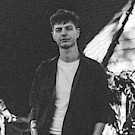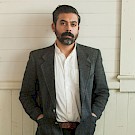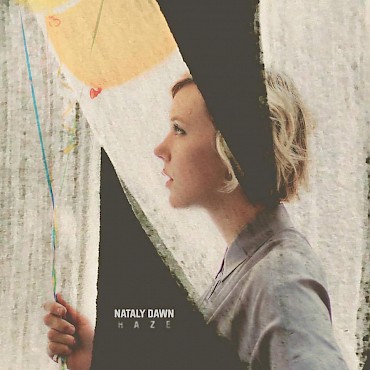 Nataly Dawn is no stranger to the new musical landscape of YouTube sensations and crowdfunding for the arts. As a solo artist and one half of the duo Pomplamoose, Dawn has used these digital means to create music since 2008, with songs and videos that have amassed nearly 115 million views and over 450,000 subscribers to her channel.
Nataly Dawn is no stranger to the new musical landscape of YouTube sensations and crowdfunding for the arts. As a solo artist and one half of the duo Pomplamoose, Dawn has used these digital means to create music since 2008, with songs and videos that have amassed nearly 115 million views and over 450,000 subscribers to her channel.
In 2013, her music partner (and now husband) Jack Conte co-founded Patreon, a crowdfunding site that provides ongoing support for artists. Patreon allows Dawn to create an average of two music videos per month with her “patrons” supporting each individual video or song that she releases, including her sophomore solo album, Haze, recorded and produced in Dawn’s home studio and mixed by Beau Sorrenson (Death Cab for Cutie, Bob Mould, Superchunk).
Haze is an emotional autopsy of confessions and conversations around the loss of relationships. It captures, as Dawn describes, both “that feeling of walking around in a haze” and “relates to the idea of being hazed: put through some strange and often cruel rite of passage.” As a daughter of missionaries, songs about her father and religion such as “Orchid” and “Amen” feature prominently on Haze. But these aren’t anti-religious anthems or angry breakup ballads. The 10 songs on Haze are melodic and precise—sharp words set to sweet hymnals ranging from sparse guitar and vocals to glittering synth ballads—as if to soften the scalpel she takes to her evangelical upbringing and poignant endings.
Nataly Dawn appears (appropriately enough) at The Old Church on Friday, November 18 with Lauren O’Connell, her collaborator on yet another project (My Terrible Friend), and openers The Native Sibling.
Your new record's opening track, “I Could Lose,” is a mix of an open-air, lo-fi sounding vocals and guitar paired with subtle, composed symphonic strings. It’s such a soft and vulnerable song to lead with instead of say, end with. Tell me about how this song was created and how it ended up as the first track.
I wrote that song while I was driving. I don't know why it is, but sometimes, I find that if I'm driving or in the shower and my brain is technically focused on one thing, that I'm suddenly able to write about something else because I'm not trying so hard to write. I wrote this song and recorded it in my bathtub and I liked the way that my guitar sounded when it was up against the back of the bathtub and how the tub was sort of this natural amp for it—it amplified the sound of the guitar, especially the bass notes. It was this very wholesome, overwhelming sound. Also, technically very shitty audio, like, not technically a good audio recording and something that probably should have been redone. I just liked the take so much. And you can actually watch it—I filmed that part of the recording process and it’s on YouTube. You can watch me singing the song in the bathtub and that's the exact take we used for the album.
Then I felt like it needed just a little something else, so I asked my friend Anton Patzner to do strings for it and he and his brother Louis recorded strings and I felt like, “That's done, that's the song.” And originally, you're right, it was supposed to be the end of the album and I've questioned it several times: “Why did you move from the last song to the first song?” One reason is because I wrote the song “Amen” towards the end of the recording process and I felt like I really had to end with “Amen.” Like you do [laughs]. The other reason was I listened to some other albums like Masterpiece by Big Thief. The album starts with this technically poor audio recording and then it goes into rock after that. I like the idea of starting with something that demanded a little more attention, so I went with that. Also, the sound of this album is quite different from my last album, and I thought that if I started with something that was an acoustic guitar vocal ballad that it would be familiar enough for people who had heard my stuff before, and it wouldn’t totally throw them off when the next song was “Haze,” which is like this epic synth ballad.
These songs are pointed explorations of exploding family relationships, friendships and love in songs like “Haze,” “For The Record,” “Old Friend,” and the amazing song and video “Call Your Love” [watch below]. You sing of a father’s regret and cancer, fighting with old lovers and reaching out to make amends. There’s no metaphor or subterfuge here—it’s all quite literal with a lot of remembrances and goodbyes. Why these songs now?
It’s funny, I almost didn’t release this album. I was very close to just calling this something from the past and moving on. They were very difficult songs to write and they were very much attached to my life, which has been the last four years where I’ve been processing and mourning several relationships. I feel like it’s very important to point out that most of the songs have nothing to do with Jack [laughs].
Exactly, and it is important to point that out, and in the same way, you wrote all these songs and produced them yourself, too, without your musical partner and other half of Pomplamoose, Jack Conte.
Right! Although I feel like the assumption is generally, “How was Jack involved?” and “Why are you writing such terrible songs about Jack when you just got married?” And I really feel like I have to put it out there—it’s not about Jack, everything’s great with Jack, not that that’s what we should be focusing on anyway, but just so you know... it’s not about Jack. It’s much more about family and close friendships.
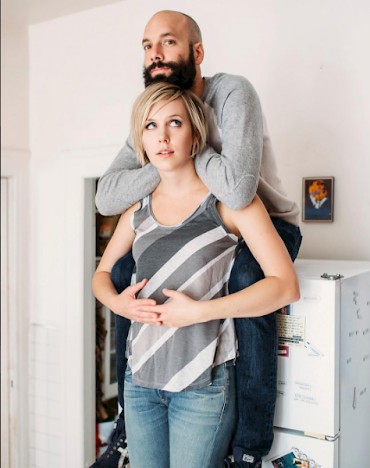 Dawn and musical partner (as well as her husband) Jack ConteI guess the reason they came out is because I was talking with Jack about the songs, and saying, “Maybe I should just let them be, don’t finish them, let them sort of simmer and move on to the next project.” Basically, just neglect them, just put them on the shelf and stop focusing on them. And he was like, “No, I think you’d be really upset if no one heard these songs.” So I’m glad that I pushed through even though it was not the most pleasant process. What I hope is that my efforts in striving to get to the bottom of these very difficult feelings will help some other people process what they’ve gone through.
Dawn and musical partner (as well as her husband) Jack ConteI guess the reason they came out is because I was talking with Jack about the songs, and saying, “Maybe I should just let them be, don’t finish them, let them sort of simmer and move on to the next project.” Basically, just neglect them, just put them on the shelf and stop focusing on them. And he was like, “No, I think you’d be really upset if no one heard these songs.” So I’m glad that I pushed through even though it was not the most pleasant process. What I hope is that my efforts in striving to get to the bottom of these very difficult feelings will help some other people process what they’ve gone through.
It’s almost a little embarrassing talking about what your songs mean to you because, generally, the way I feel about a song is, it’s a way to get to the bottom of something—to be very honest and to put it out into the world—kind of drop the mic and leave. Once the song is out, you’ve finished the process for yourself as an artist. Sort of, “I made this song, it’s out there, now it’s yours, it can be whatever you want it to be.” But you don’t really feel like you need to go back and reexamine what that song is for you anymore. I feel like I need to hide underneath something like, “I can’t go back there, I can’t look at that anymore.”
On both “Maybe If” and “Waiting Room,” where it is especially realized, there are very syncopated, time-keeping clock sounds for percussion. Both sound like a treatise about living on pause and the what-ifs that keep you up at night. Are there other places where you were very conscious of the instrumentation to bring out those themes?
Producing this record was a learning process. All of the tools that I was working with were completely new to me, and for the very first time, I was alone in the recording process and trying to do everything myself. Even though I would get to the end of the song and say, “Mmm, I think I want live drums on this now,” and I would reach out to my friend Louis Cole and say, “Hey, can you put some drums on this?” Anyone else came in at the very end. So, the strings came when everything was already done, and with the drums it was the same way.
Basically, it was just me alone in my home studio for three or four years trying to make this thing. And I was working on Ableton for the first time—I was working on ProTools and switched. Ableton is really not something that’s generally used for folk singer-songwriters [laughs]; it’s mostly used for DJs. But the cool thing about working in Ableton is that I felt like I was working much faster, just layering sounds and trying different synths and different drum beats and effects—just trying things. Sort of scrambling and going through lists of sounds and picking one and eventually saying, “Okay that works, let’s move on.” It was both intentional and a freakshow of “uhhhh... I don’t know, this?! Sure, let’s do this!” [Laughs] So, it’s interesting that in the end it actually does feel like the production is sort of cohesive, because at the time it was like throwing spaghetti at the wall.
Tell me about who you are singing to on “The Audience.” You don’t have to name names, but it sounds like an “Oh crap, will you still know the real me if I get huge or lose my way while I tour?”
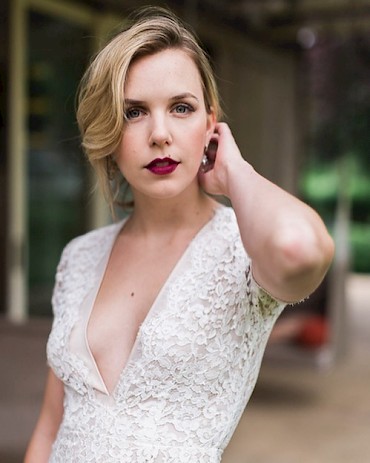 “The Audience” was maybe the first song that I wrote for the album. I wrote it about four years ago when I was touring for my last record, How I Knew Her. It was the first time that I’d been on the road touring at that big of a scale. I was doing national tours and in Europe. Part of being signed to a label was that suddenly I had access to tour support, which was really cool and different and also, I discovered at that time that touring is really fricking hard and it’s not something that I want to do full-time. Which kind of seemed a little bit like a deal breaker, because if you’re not going to tour, what is this label going to do with you and how are you going to make a living as an artist? Which is another topic and I’ve kind of figured that out.
“The Audience” was maybe the first song that I wrote for the album. I wrote it about four years ago when I was touring for my last record, How I Knew Her. It was the first time that I’d been on the road touring at that big of a scale. I was doing national tours and in Europe. Part of being signed to a label was that suddenly I had access to tour support, which was really cool and different and also, I discovered at that time that touring is really fricking hard and it’s not something that I want to do full-time. Which kind of seemed a little bit like a deal breaker, because if you’re not going to tour, what is this label going to do with you and how are you going to make a living as an artist? Which is another topic and I’ve kind of figured that out.
But it was a hard time for Jack and me. It was definitely not one of the easiest parts of our relationship and I started asking myself, “Why am I doing all of this? Why am I choosing to be away from this person?” I think I was feeling those growing pains. The opening line is, “I’ve got meat and greases under my skin.” I had just played a show in London and had gone to this place that had American food and it reeked of pickles and it was just sort of weird. We went to this American restaurant, but it was like super hip and, “Yeah, let’s go to this American restaurant.” I just remember going back to the hotel feeling gross and sick and far away from home and I couldn’t reach Jack because we were in different time zones and I just remember feeling like, “What the fuck am I doing?” I’m really happy to be doing things differently now, I can tell you that much. Patreon is how I do it.
In listening through your music there is something different here than in your other efforts. There’s some '60s-sounding guitars, organ and strings—the instrumentation is decidedly different. There was always this element of vaudeville or playfulness, and I hear a little less of that here—it’s moved in a new direction. What does Haze mean to you now that it’s realized and released?
Haze does feel to me, like I’m older. I’ve grown up a little bit since my last album. I just turned 30, so I’m all the more aware of the getting older thing. With it comes a certain amount of disillusion, but also a bit more peace about how things are.
It’s so hard to explain to people. It’s actually one of the very frustrating things about YouTube for me. Somewhere in the comments, every time I post a video on my solo channel, someone is asking, “Where’s Jack?” or “How are things going with the guy with the beard?” or “Are you guys okay?” It’s just like, “Why?” Shoe on the other foot—on Jack’s channel, nobody is asking Jack on his electronic channel, “Where’s the girl?” It’s like, “Come on guys, I’m a person that exists outside of this relationship.” And I have to remind myself that the vast majority of my fans do not post comments on YouTube and the vast majority of people posting comments on YouTube are positive, but for some reason, that tiny percentage of people gets under my skin every time.
I do feel like the making of Haze was such a transitional phase for me. I don’t want to be a pessimist and say, “Well, things are just less giddy now,” because the truth is, when I make things with Jack and Pomplamoose, it’s very much an outlet for fun for both of us. But our solo music tends to be more serious and more introspective. I think I’ve just become a little less flippant [laughs]. Still, I’d say, I'm definitely happy and at peace about how things are, but a little less tongue in cheek now.

